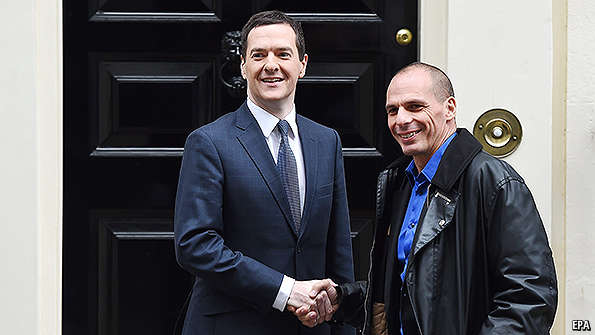By The Guardian
UK chancellor, speaking in Istanbul, highlights growing danger of continued deadlock over Greece’s bailout programme
Britain’s chancellor of the exchequer has warned that the risks of a “very bad outcome” from the Greek debt crisis have risen.
Speaking in Istanbul, George Osborne told Bloomberg TV there was a growing danger that the deadlock over Greece’s bailout programme would spiral out of control.
And he cautioned that this could potentially cause serious damage to the global economy as well as the UK’s.
Osborne raised the pressure on Athens, and its creditors, by declaring:
“It’s clear that the risks to the world economy, the risk to the British economy of this standoff between the eurozone and Greece, is growing each day.
The risks of a miscalculation or a misstep leading to a very bad outcome are growing as well.”
Osborne said the UK had been arguing for both sides in the Greek debt crisis to find some common ground, during the G20 meeting of finance ministers in Turkey.
Eurozone finance chiefs will meet in Brussels on Wednesday night for an extraordinary meeting to discuss the Greece crisis.
According to sources at the Athens finance ministry, Greece will propose a bridging loan to cover its funding needs until September, and also offer new economic reforms to replace some of its existing austerity package.
Osborne’s comments come a day after the UK prime minister, David Cameron, chaired a meeting of senior officials to discuss the impact on the UK of a possible Greek exit from the eurozone.
Osborne was blunt about the risks that a disorderly “Grexit” would pose to the global economy. There’s “no doubt” that the UK economy would be affected by a renewed eurozone crisis, he told Bloomberg.
Osborne is due to speak this afternoon at the British Chambers of Commerce annual conference in London. Meanwhile, the boss of the BCC, John Longworth, is expected to tell the conference that a new settlement for Britain in Europe is “essential”, making clear that whoever wins the general election they will need to thrash out a new deal.
“More than any repatriation of powers, businesses want to know that the UK has safeguards against being drawn closer to the eurozone – especially as history tells us that currency unions inevitably fall apart unless there is real political, economic and social integration,” Longworth is expected to say.
“Without true reform, business support for the European project is far from guaranteed. A new settlement for Britain in Europe is essential to achieving our economic ambitions – helping our businesses succeed here at home, and across the world.
“Above all, the debate over Europe must not be hijacked by political ideology. Economic pragmatism – what’s best for Britain, for British business, for our national growth ambitions – must win the day.”



















